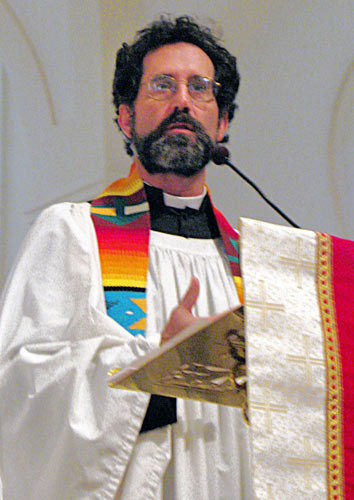Every time a New Yorker bites into an apple grown in New York State – one of the top three apple growers in the United States – little do they know that the apple they are enjoying was likely picked by a worker from Jamaica or Haiti who is in this country on the Guest Worker Program.
Nor would the apple eater have any idea of the colossal hardships these workers and other migrant workers face as they play a crucial role in providing us all with fresh fruit and vegetables.
Parishioners at the Holy Apostles Church in Manhattan were fortunate to learn about these issues from Episcopal priest Richard Witt, executive director of the Rural and Migrant Ministry, when he preached a sermon and gave an educational presentation at the church earlier this month.
Father Witt explained, for example, that guest workers, such as those from Jamaica and Haiti, are here officially on a visa so they don’t have to worry about being deported. However, once the job is done, they are required to go back home. It is not a path toward citizenship.
Furthermore, guest workers have no right to self-determination: they can only work on the farm they’ve been assigned to for a specific amount of money and for a specific length of time. If they have any problems, they can’t just leave and go work for another farmer. “And frankly,” Witt stated, “there are a couple of farms in New York State that are notoriously bad places to work. There is verbal and physical abuse to the point that the owners have trouble finding workers, but they’ve been able to get guest workers sent to labor on their farms.”
As Father Witt also noted, theoretically, guest workers have a few more rights than other farm workers. They are supposed to be entitled to a pay level that is slightly higher than the prevailing migrant worker wage and they are entitled to some medical coverage. Meanwhile, most of the guest workers are afraid to use the coverage for fear they will be labeled sickly, and they are scared to raise any other concerns for fear they will be branded a troublemaker and not allowed back in the future. They feel they must toe the line or face severe consequences.
Father Witt also explained that the denial of basic rights specifically to farm and domestic workers originated more than 70 years ago when President Franklin Roosevelt’s administration won major reforms to protect other workers regarding such issues as overtime and disability pay, days of rest and the right to collective bargaining. It was during the Jim Crow era, however, and segregationist Southern Congressmen simply could not bear to give African-Americans – who then made up most of the farm and domestic labor force – equal treatment in the workplace as whites. Roosevelt caved in to the racists and wrote farm and domestic workers out of the legislation.
This exclusion of farm workers from federal labor laws put the responsibility on individual states to right this wrong. Unfortunately, New York State has not seen fit to do so. It continues to exempt “service on a farm” from the definition of what constitutes an “employee.”
The State Legislature has addressed a few exclusions in recent years, namely, granting farm workers the same minimum wage standard and requiring the provision of drinking water and toilets in the fields. While these are important first steps, the overall exclusion remains, despite the consistent efforts of many dedicated activists to get a bill passed in Albany that would give farm workers the same rights as employees in other industries.
One such activist is the world-renowned folksinger, Pete Seeger, who has long stood for justice for migrant workers through his songs and actions. On April 17 at Riverside Church in Harlem, this soon-to-be 93-year-old icon hosted Voices of Hope in Concert, sponsored by Rural & Migrant Ministry to benefit the Justice for Farmworkers Campaign.
After warmly greeting the assembled crowd Seeger said, “I don’t have much voice left, but if you’ll help me out, I think we can make some nice music together.” He then led the audience in a spirited rendition of his enduring hit “Quite Early Morning.”
Among the other outstanding performers were Kim and Reggie Harris, two consummate musicians and storytellers who combine a strong folk and gospel legacy. Mr. Harris said he himself is a descendant of farm workers – enslaved Africans who were forced to work the land. “While people are not held in slavery in the same way they were during the time of Harriet Tubman and Frederick Douglass, the mental attitude as a nation has not changed much,” he declared. “Labor is still not valued, and people in authority are still unwilling to give farm workers the rights they deserve.”
During the event, Gina Figueroa, a Sal/Soul R&B singer and actress, brought down the house with her vocal numbers, accompanied by Valerie Kelley, Edwin Lugo and John Quilty. Respected stage performers Tyrone Aiken and Larry Marshall each gave stunning renditions of gospel classics, while Jeannine “Jahneen” Otis, emma’s revolution (Pat Humphries and Sandy Opatow), and Andres Chamorro also thrilled the crowd with their dynamic performances.
Rounding out the evening were spoken word artist Maria Christina Martinez and migrant worker Sostenes Uribe, who moved everyone deeply with his heartfelt message.
On May 21, activists are heading to Albany for Farmworker Albany Day. For more information, please contact Justice for Farmworkers Campaign coordinator Gerardo Gutierrez at (845) 485-8627.




























